The Role of Medication Management in Treating Co-Occurring Disorders

Understanding the Significance of Medication Management in Co-Occurring Disorders
Medication management plays a vital role in the effective treatment of individuals experiencing co-occurring mental health and substance use disorders. As these conditions often intertwine, addressing both simultaneously through well-coordinated pharmacological interventions enhances the potential for recovery. Despite its importance, access to medication-assisted treatments remains limited, with only a quarter of behavioral health agencies offering integrated care. Exploring principles, best practices, and recent research reveals that tailored medication strategies, when integrated with therapy and support services, significantly improve symptom stabilization, relapse prevention, and overall quality of life for affected individuals.
Principles and Best Practices for Pharmacological Interventions
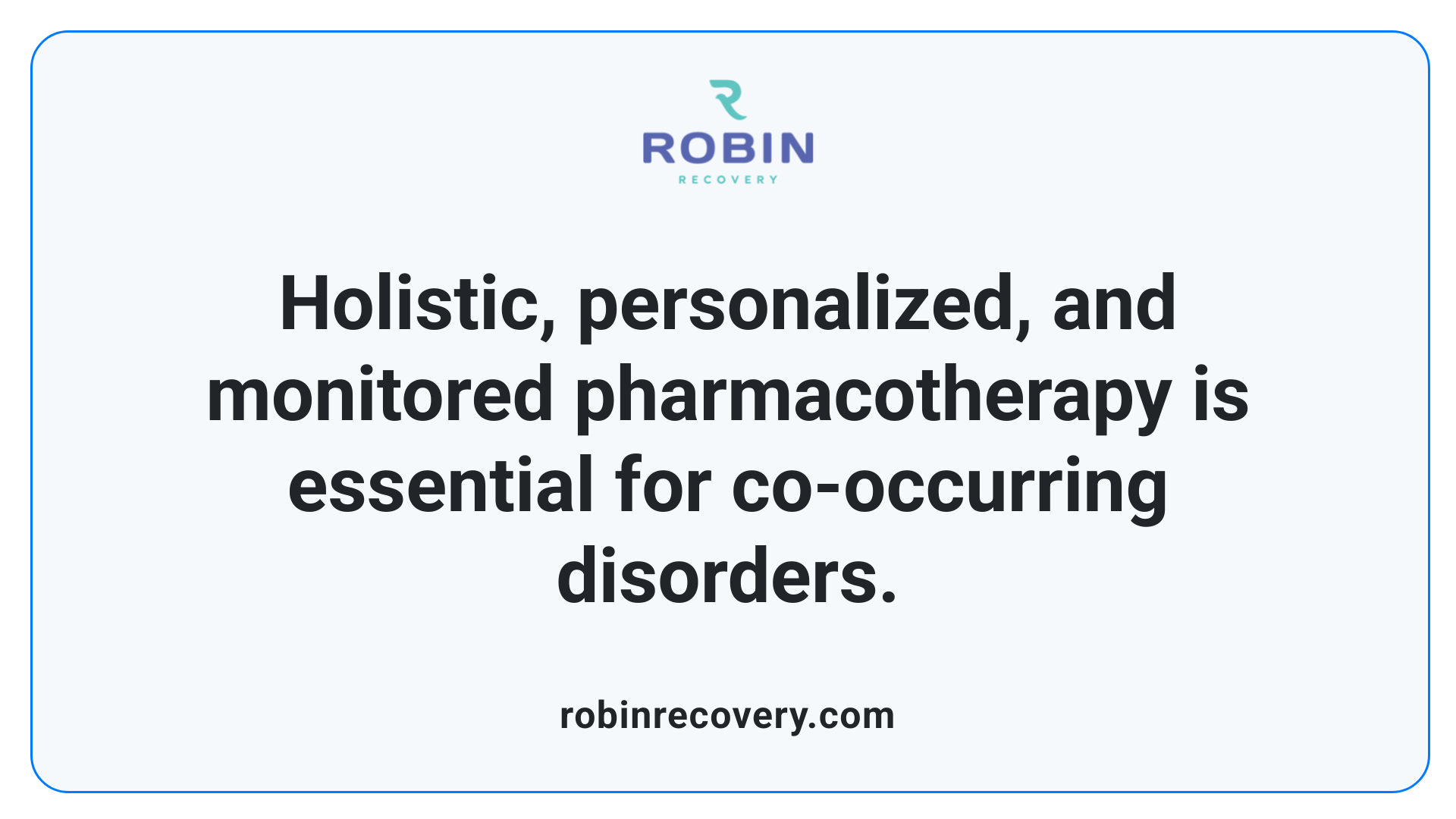
What are the principles and best practices for pharmacological interventions in co-occurring disorders?
Treating individuals with co-occurring mental health and substance use disorders (COD) requires careful consideration of various principles that guide effective medication management. These principles focus on delivering personalized, safe, and integrated care to optimize recovery outcomes.
First, treatment must be individualized. Every person with COD presents a unique combination of mental health symptoms and substance use issues. Comprehensive assessments are crucial to identify the specific disorders, severity, history, and any family or medical background. This information informs a tailored medication plan that targets each condition effectively.
Ongoing monitoring is vital to ensure safety and efficacy. Healthcare providers should regularly review medication effects, watch for adverse reactions, assess potential drug interactions, and adjust dosages as needed. Vigilant monitoring helps prevent complications, misuse, or adverse effects, especially with medications like benzodiazepines which carry dependency risks.
Integrating pharmacotherapy with psychosocial interventions enhances treatment success. Evidence supports combining medications with therapies such as cognitive-behavioral therapy (CBT), dialectical behavior therapy (DBT), and motivational interviewing. These psychosocial strategies help address behavioral aspects, improve adherence, and reinforce skills necessary for long-term recovery.
Medication selection should align with current evidence-based guidelines. For example, antidepressants like SSRIs are prescribed for depression, mood stabilizers for bipolar disorder, and medications like buprenorphine or methadone are used in medication-assisted treatment for opioid use disorder. The choice of medications should also consider the potential for misuse or dependency, with careful use of benzodiazepines being particularly important.
Caution must be exercised to prevent misuse or adverse effects. This requires strict adherence to dosing protocols, thorough patient education about medication risks, and clear communication with patients. Providers should also evaluate the potential for abuse, especially in vulnerable populations.
Utilizing integrated care models, whether coordinated, co-located, or fully integrated, facilitates comprehensive management. Such models promote collaboration among healthcare providers across disciplines, improve diagnosis accuracy, streamline treatment delivery, and reduce hospitalization rates.
Finally, continuous assessment and community linkage play a critical role. Regular follow-ups, community-based support, and linkage to social services ensure ongoing stability. These practices help sustain medication adherence, detect early signs of relapse, and support overall well-being.
In summary, effective pharmacological intervention in co-occurring disorders hinges on personalized treatment planning, diligent monitoring, integration with psychosocial care, adherence to evidence-based protocols, cautious medication use, application of integrated care frameworks, and ongoing community engagement. These principles collectively foster a holistic approach that promotes recovery and minimizes risks, aligning with best practices supported by research and clinical guidelines.
Implementing Medication Management within Treatment Programs
What are the best practices for implementing medication management within treatment programs for co-occurring disorders?
Effectively managing medications for individuals with co-occurring disorders (CODs) requires a strategic and well-coordinated approach. The best practices focus on developing tailored, stage-wise treatment plans that seamlessly integrate both pharmacological and psychosocial interventions.
Creating a personalized plan begins with comprehensive assessments to understand each person's unique mental health conditions and substance use issues. These plans should be adaptive, allowing clinicians to modify prescriptions and supportive services as individuals progress through different recovery stages.
Participation of prescribers trained in evidence-based methodologies is essential. These professionals should be integral members of multidisciplinary care teams, collaborating closely with therapists, social workers, and medical providers. This teamwork fosters holistic care, ensuring medication use complements therapy and other support systems.
Cautious prescription practices are vital. Medications should be selected considering their potential for abuse and their efficacy in alleviating symptoms of mental health conditions—such as anxiety, depression, bipolar disorder, or psychosis—while also addressing substance cravings and withdrawal management.
Regular, continuous assessment and re-evaluation form the backbone of successful medication management. These evaluations help track medication adherence, monitor side effects, and assess overall progress. They enable timely adjustments to prescriptions to prevent relapse and optimize therapeutic outcomes.
Provider training remains a cornerstone. Clinicians need ongoing education about the latest evidence-based treatments, risks of medication misuse, and emerging medication options that can simultaneously target mental health and substance use symptoms.
Furthermore, strict adherence to fidelity in implementing integrated treatment models is crucial. Ensuring consistency and quality across care settings maximizes safety and effectiveness.
Finally, fostering collaboration across disciplines allows for shared decision-making, which is key to addressing the complex needs associated with CODs. This multidisciplinary approach promotes safer prescribing, comprehensive monitoring, and the early detection of potential issues, ultimately supporting sustained recovery and improved quality of life.
Supporting Integrated Treatment Approaches Through Medication Management
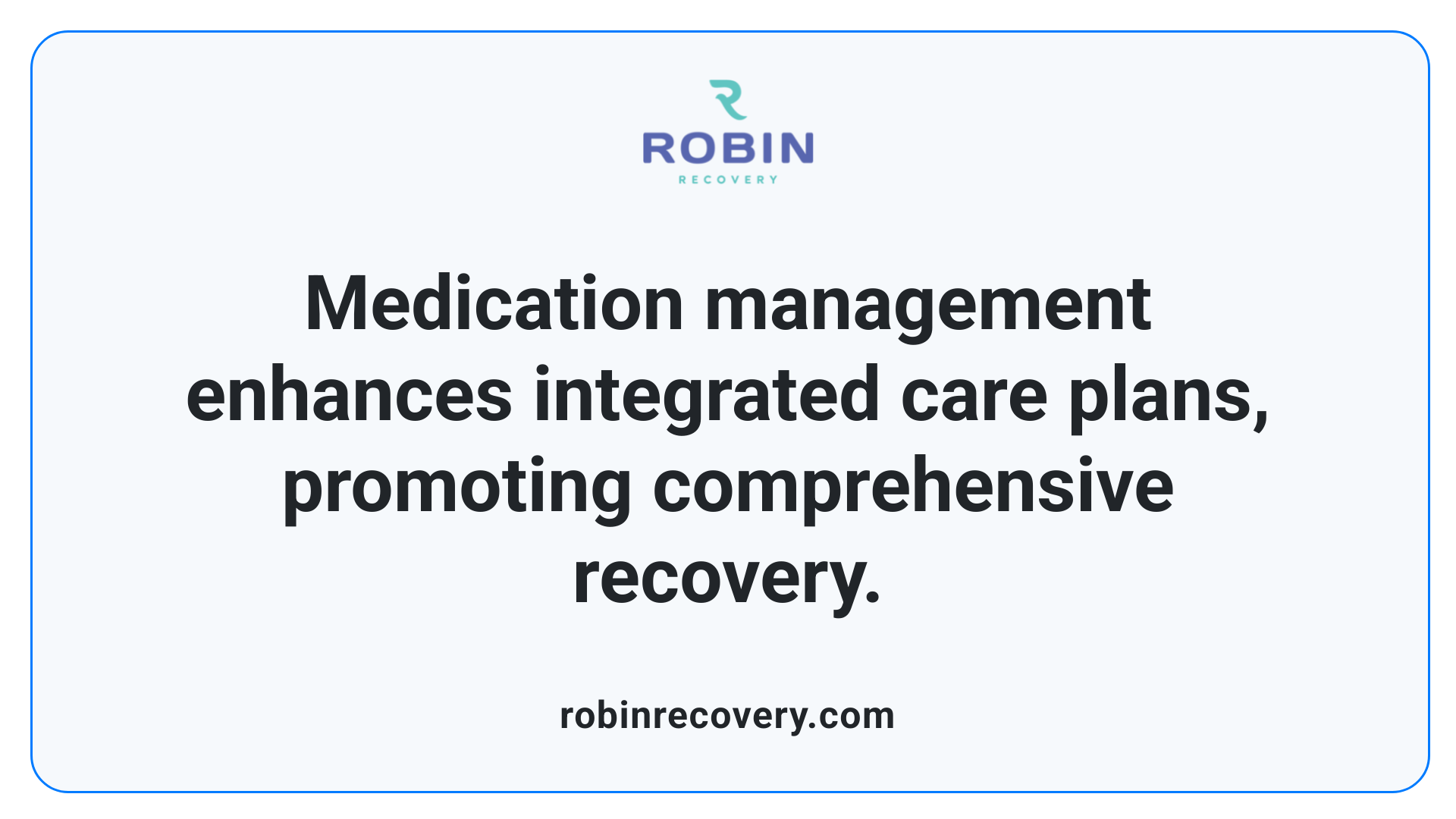
How does medication management support integrated treatment approaches for co-occurring conditions?
Medication management plays a crucial role in the effective treatment of co-occurring disorders by ensuring that pharmacological interventions are well-coordinated with behavioral therapies and support services. This integrated approach provides a comprehensive, continuous care plan tailored to the individual's unique needs.
The process involves regular assessment and careful adjustment of medications to target both mental health symptoms—such as depression, anxiety, or psychosis—and substance use issues. By maintaining a dynamic medication plan, healthcare providers can respond to changes in symptoms, reduce side effects, and prevent adverse interactions.
Incorporating medication management alongside psychosocial therapies, such as cognitive-behavioral therapy (CBT) or dialectical behavior therapy (DBT), enhances treatment adherence. Patients are more likely to follow their prescribed regimens when medications are part of a holistic care system that supports their recovery journey.
Utilizing evidence-based protocols and screening tools is vital for optimizing medication effectiveness. These tools assist clinicians in monitoring treatment progress, identifying potential drug interactions, and adjusting prescriptions to maximize benefits.
This person-centered, holistic care approach addresses the complex needs of individuals with co-occurring disorders. It promotes recovery by reducing symptoms, preventing relapses, and supporting overall well-being.
In practice, skilled practitioners trained in integrated care work collaboratively across disciplines, ensuring that medication management complements therapeutic interventions. This alignment helps to stabilize the patient's condition, improves treatment outcomes, and ultimately enhances quality of life.
With an emphasis on coordinated and continuous care, medication management supports the overarching goal of comprehensive recovery—addressing both mental health and substance use disorders simultaneously for sustainable results.
The Role and Impact of Medication Management in Co-Occurring Disorders
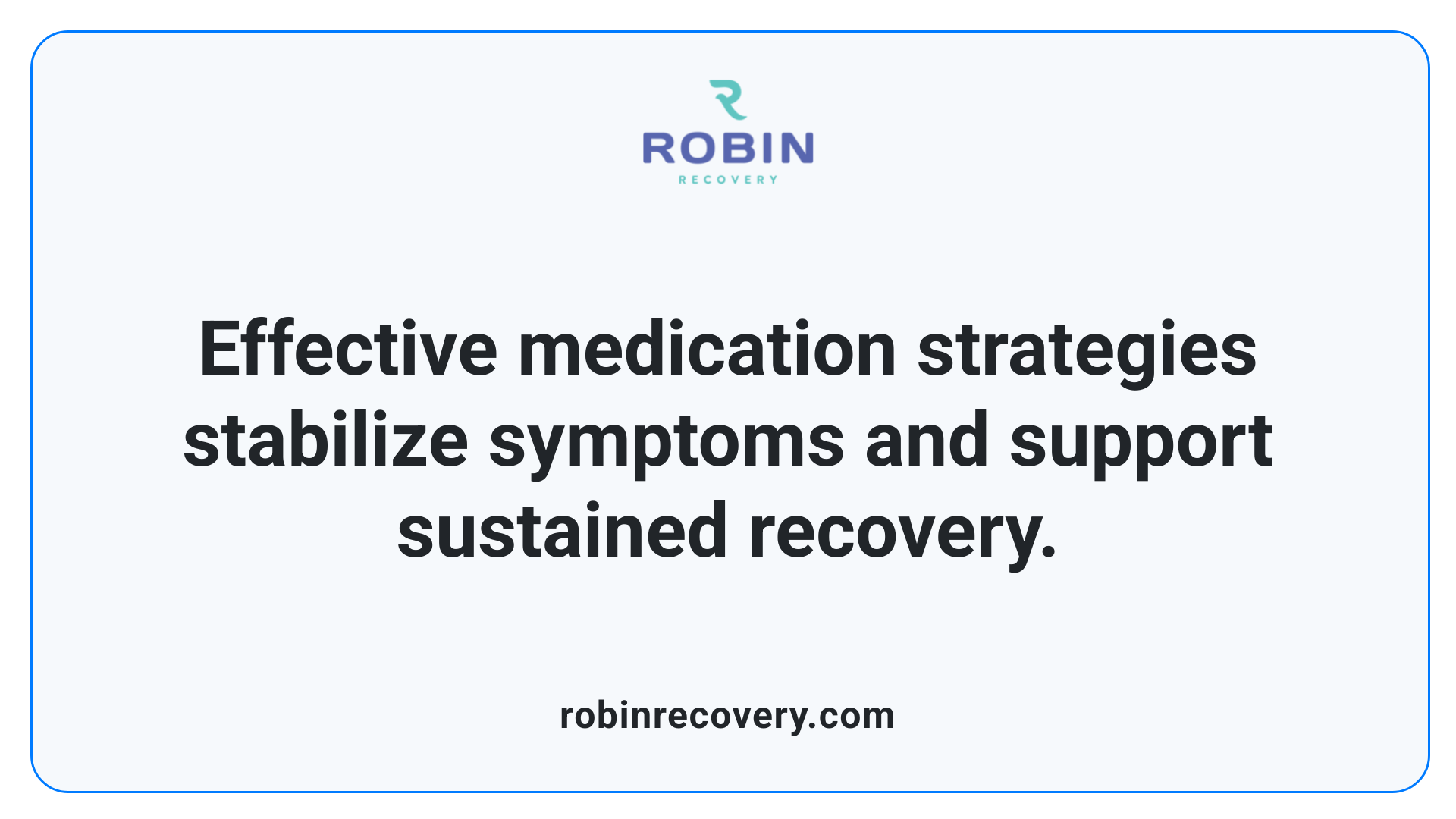
What is the role of medication management in treating co-occurring disorders?
Medication management is a crucial element in the treatment of co-occurring mental health and substance use disorders. Its primary purpose is to stabilize symptoms associated with both conditions, reduce the risk of relapse, and support the overall recovery process.
Effective medication management involves the careful selection and use of pharmacological treatments tailored to the individual’s specific diagnoses. This includes medications for mental health conditions, such as antidepressants, antipsychotics, mood stabilizers, and anti-anxiety drugs, along with medications to address substance use issues, including opioid agonists like methadone, buprenorphine, or Naltrexone. Combining these medications with psychotherapeutic interventions creates an integrated approach that addresses the complex interplay of co-occurring disorders.
Monitoring is a vital part of medication management. Healthcare providers regularly review medication efficacy, watch for potential side effects, and check for dangerous drug interactions, especially considering the high rates of substance misuse and the use of multiple medications in this population.
Recent advancements emphasize the importance of structured implementation strategies, such as the NIATx model. This approach involves training, coaching, and process improvements to enhance medication access and adherence. Studies have shown that adherence to these strategies correlates with increased access to prescribed medications, which translates to better symptom control and improved treatment outcomes.
In addition, integrating medication management into comprehensive care plans reduces hospitalizations, diminishes symptom severity, and enhances daily functioning. It also plays a vital role in preventing relapses, supporting neurochemical balance, and fostering resilience against triggers and stressors.
When used effectively within an organized, patient-centered framework, medication management significantly improves the quality of life for individuals living with co-occurring disorders. The ultimate goal is to provide ongoing, personalized care that supports stability, reduces the risk of medication-related complications, and sustains long-term recovery.
Supporting Evidence from Scientific Research
How does scientific research inform medication-assisted treatments for co-occurring disorders?
Scientific investigations provide a robust foundation for the use of medication-assisted treatments (MAT) in addressing co-occurring disorders. Through rigorous studies, including randomized controlled trials, researchers have demonstrated that combining pharmacological approaches with behavioral therapies significantly enhances treatment outcomes.
One notable example is the Whole Health Study, which evaluated integrated care models that simultaneously target opioid use disorder (OUD) and mental health issues such as depression or anxiety. The results showed that individuals receiving coordinated treatment, including medications like buprenorphine, methadone, or naltrexone alongside therapy, experienced higher remission rates and a reduction in substance use compared to traditional treatment methods.
Medications used in MAT contribute directly to symptom management by reducing cravings and easing withdrawal symptoms. For instance, buprenorphine and methadone stabilize brain chemistry in opioid dependence, allowing individuals to engage more effectively in therapy and daily life. Naltrexone, on the other hand, blocks the euphoric effects of opioids and alcohol, decreasing the likelihood of relapse.
Research also highlights that integrating mental health treatment with MAT in primary care settings can improve medication adherence and treatment retention. This integrated approach offers a more holistic pathway to recovery, addressing both the biological and psychological components of co-occurring disorders.
Despite the strong evidence supporting MAT, systemic barriers such as limited access, regulatory restrictions, and stigma can impede implementation. Addressing these challenges requires policy reforms, increased provider training, and awareness campaigns to expand access.
In summary, scientific research confirms that evidence-based, integrated treatment models—including medications like buprenorphine, methadone, and naltrexone—are vital in improving recovery outcomes for individuals with co-occurring disorders. These findings support ongoing efforts to enhance the accessibility and effectiveness of medication-assisted treatments across healthcare systems.
Research Supporting Treatment Outcomes
Study / Initiative Focus Area Results / Impact Reference / Notes Whole Health Study Integrated care for OUD and mental health Increased remission rates, reduced substance use Demonstrates effectiveness of combined pharmacotherapy and therapy Randomized Controlled Trials Efficacy of MAT Reduced cravings, improved treatment retention Validates the role of buprenorphine, methadone, Naltrexone Systematic Reviews Systemic barriers to MAT Identifies access issues, suggests policy improvements Highlights need for policy change to expand access Primary Care Integration Studies Mental health and addiction Enhanced medication adherence, better outcomes Supports model of integrated services
Opportunities and Challenges in MAT Deployment
Barrier / Opportunity Description Policy & Regulation Need for reform to reduce restrictions Education & Training Provider knowledge gaps hinder implementation Public Perception & Stigma Societal attitudes affect acceptance Access & Availability Geographical and socio-economic disparities Insurance & Funding Financial barriers limit treatment options
Efforts to overcome these barriers can significantly improve the effectiveness and reach of MAT, ultimately contributing to better health outcomes for those with co-occurring disorders.
Medication Management's Contribution to Recovery and Relapse Prevention
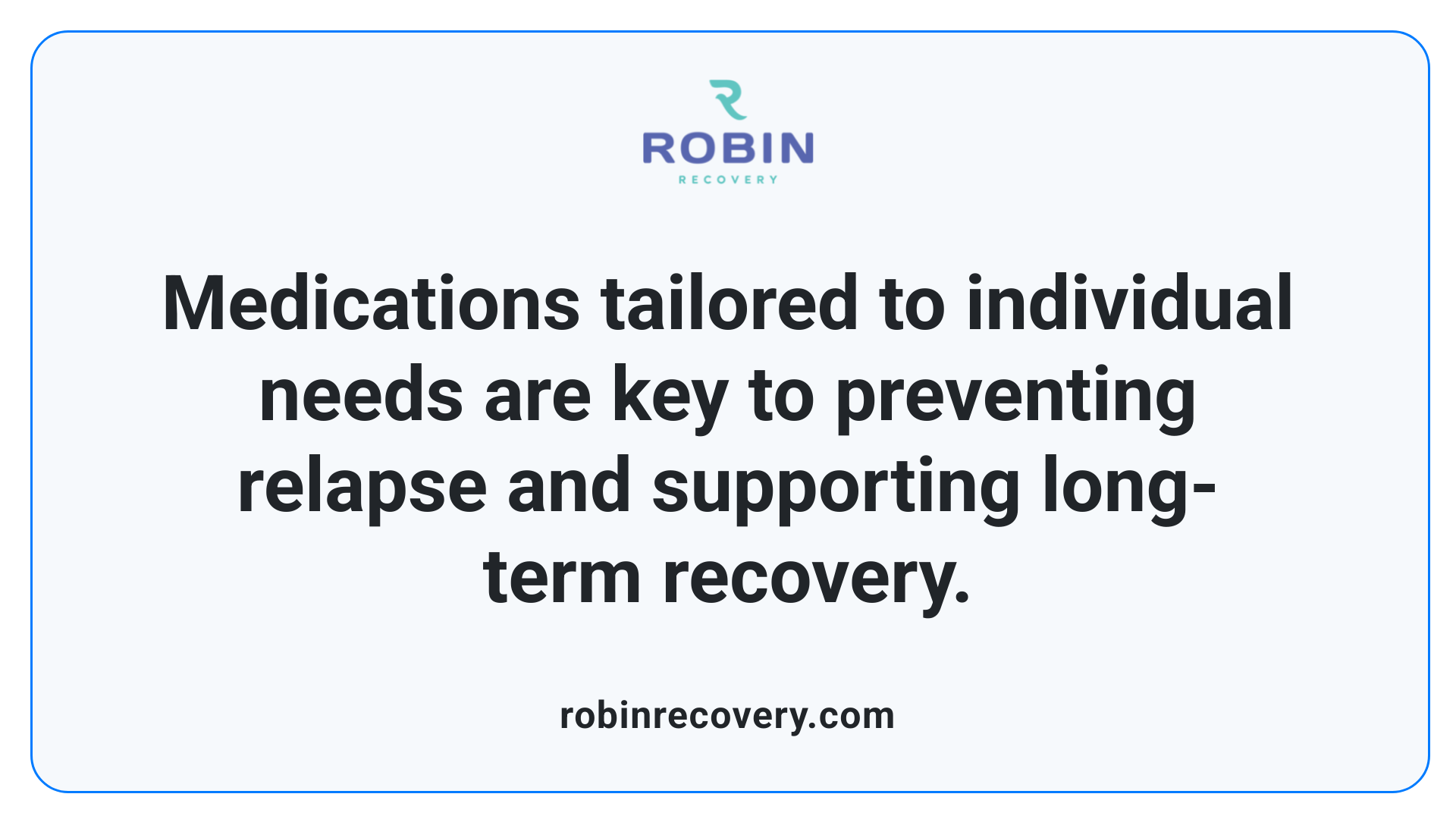
How does medication management support recovery and prevent relapse in individuals with co-occurring disorders?
Medication management is a vital aspect of treating co-occurring disorders, playing a major role in helping individuals achieve and maintain recovery. It focuses on stabilizing mental health symptoms, curbing cravings, and preventing relapse — all essential for long-term well-being.
For people dealing with substance use disorders such as alcohol and opioids, specific medications like disulfiram, naltrexone, acamprosate, methadone, and buprenorphine are often prescribed. These drugs serve to diminish the desire to consume substances and provide barriers to relapse. For instance, disulfiram creates unpleasant effects when alcohol is ingested, deterring drinking. Naltrexone and acamprosate can reduce cravings and help sustain abstinence.
In opioid addiction treatment, medications like methadone and buprenorphine are used to stabilize brain chemistry, lessen withdrawal symptoms, and block the euphoric effects of opioids. When combined with supervised administration and monitoring, these medications support safer detoxification and reduce the risk of relapse.
Beyond medication, psychosocial interventions such as cognitive-behavioral therapy (CBT) complement pharmacological efforts. They help address psychological triggers and social challenges that might otherwise lead to substance use or mental health deterioration.
Regular follow-up through drug screenings, mental health assessments, and support from healthcare teams ensures medication adherence and early detection of potential warning signs. This ongoing oversight enables adjustments to treatment plans and prevents setbacks.
Moreover, personalized relapse prevention strategies are incorporated into treatment, considering the individual's unique triggers, barriers, and recovery goals. Education about medication effects, potential side effects, and the importance of compliance empowers patients and encourages their active participation.
In summary, medication management’s comprehensive approach — incorporating effective pharmacotherapy, psychosocial support, consistent monitoring, and individualized relapse prevention plans — significantly enhances long-term recovery prospects. It not only reduces the risk of relapse but also supports stability, improved functioning, and sustained recovery.
Medication Type Purpose Associated Disorders Additional Details Disulfiram Deterrent Alcohol Use Disorder Causes adverse reactions with alcohol to discourage drinking Naltrexone Craving reduction Alcohol and Opioid Use Disorders Also used in relapse prevention for opioid dependence Acamprosate Support abstinence Alcohol Use Disorder Modulates brain chemistry to reduce cravings Methadone Opioid substitution Opioid Use Disorder Used in supervised maintenance therapy Buprenorphine Partial opioid agonist Opioid Use Disorder Less addictive and used in outpatient settings
Overall, medication management integrated with psychosocial care forms the backbone of effective treatment for co-occurring disorders, promoting sustained recovery and reducing relapse risks.
Special Considerations in Treating Co-Occurring Eating and Mental Health Disorders
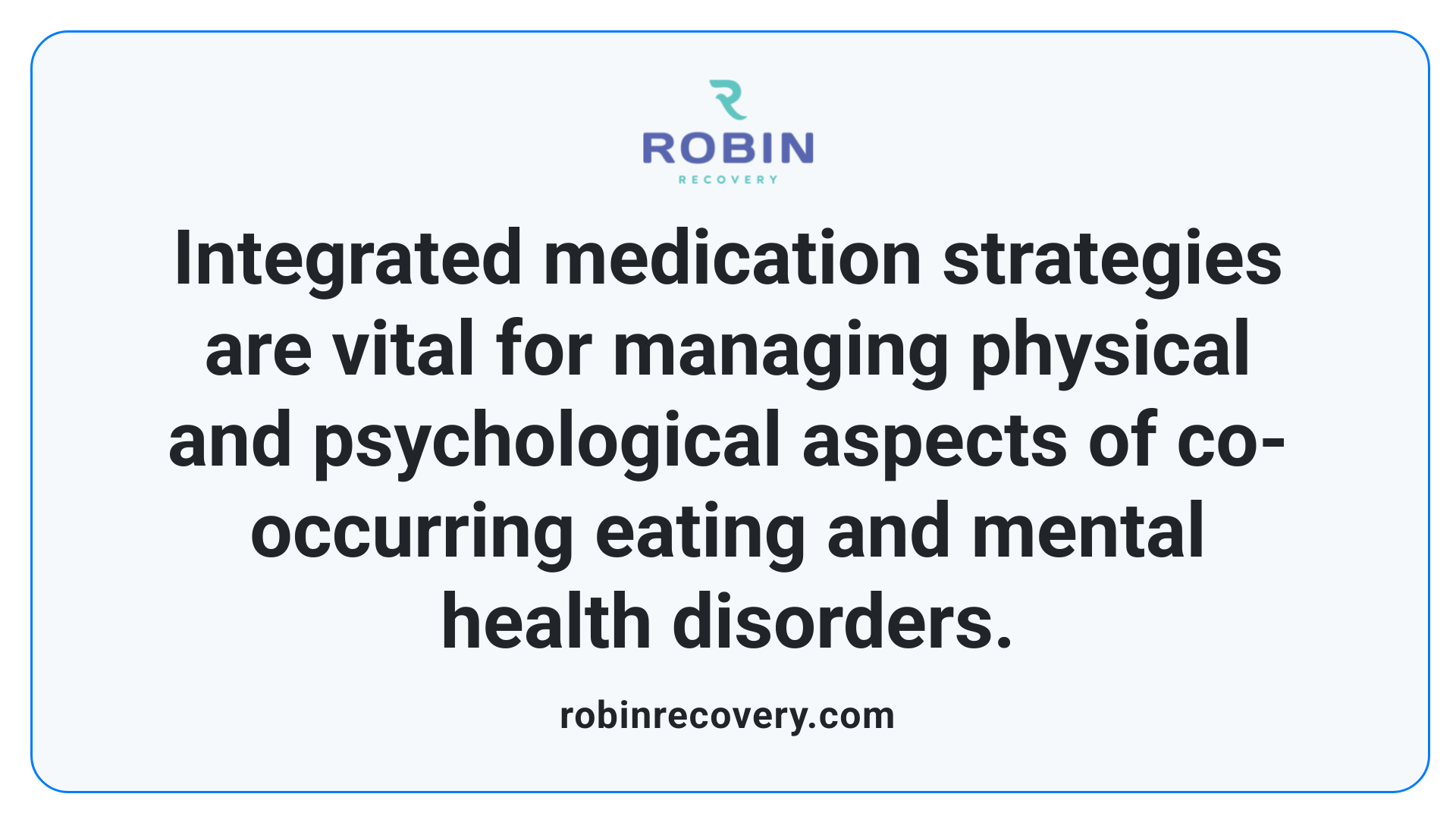
What is the importance of medication management in managing co-occurring eating disorders alongside mental health conditions?
Medication management is vital when addressing co-occurring eating disorders and mental health issues. These disorders often coexist with symptoms such as depression, anxiety, and impulsive behaviors like binge eating or purging. Proper medication use helps stabilize these symptoms, reducing emotional distress and behavioral disruptions.
Medications can also play a role in managing physical health complications caused by disordered eating, such as cardiac issues, gastrointestinal problems, and electrolyte imbalances. They aid in promoting normal eating patterns and decreasing compulsive behaviors. When integrated into a broader treatment plan—including psychotherapy, nutritional counseling, and medical oversight—medication management enhances overall recovery.
Managing physical health risks with effective medication strategies
Eating disorders pose significant physical health risks, such as heart problems or gastrointestinal disturbances. Medications are used prudently to mitigate these risks by addressing underlying mental health conditions that may exacerbate physical symptoms.
For example, antidepressants like SSRIs not only help in managing depression but can also reduce binge-purge cycles and obsessive-compulsive behaviors related to eating. Other medications may be chosen for their ability to support physical health while also targeting psychological symptoms.
Close monitoring is crucial to avoid adverse effects, particularly because some medications have side effects that could potentially worsen physical health or interact dangerously with nutritional deficiencies common in eating disorders.
Integrating medication with psychotherapy and nutritional care
A holistic approach to treatment combines medication management with psychotherapy and nutritional strategies. Psychotherapies such as Cognitive Behavioral Therapy (CBT) and Dialectical Behavior Therapy (DBT) help modify thought patterns and behaviors, while medications support emotional and physical stability.
Nutritional care targets restoring healthy eating habits and addressing nutrient deficiencies. Together, these efforts can create a supportive environment where individuals feel empowered in their recovery journey. Effective communication among healthcare providers ensures that medication plans complement therapeutic and nutritional interventions.
Early detection and tailored medication strategies to improve recovery outcomes
Early diagnosis of co-occurring issues is essential for prompt intervention. Tailoring medication strategies to each individual's unique needs—considering factors like medical history, severity of symptoms, and potential side effects—optimizes their effectiveness.
Early detection also allows for adjustments in medication to prevent escalation of health risks, support mood stabilization, and reduce cravings. This proactive approach improves overall recovery outcomes by preventing complications and promoting sustained psychological and physical health.
In summary, medication management plays an integral role in managing co-occurring eating and mental health disorders. It helps stabilize symptoms, manage physical health risks, and works synergistically with psychotherapy and nutritional care. Early, personalized intervention enhances the prospects for long-term recovery, ultimately supporting better quality of life for those affected.
A Holistic Approach to Treatment and Recovery
Integrating medication management within comprehensive treatment programs significantly enhances the potential for successful recovery in individuals with co-occurring disorders. It ensures symptom stabilization, reduces relapse risks, and supports long-term well-being. As research continues to evolve, it is essential for healthcare providers to adhere to evidence-based principles and best practices, fostering coordinated, person-centered care. Overcoming barriers to access, implementing innovative strategies, and fostering multidisciplinary collaboration remain critical to delivering effective pharmacological interventions. Ultimately, medication management—when thoughtfully integrated into holistic treatment approaches—serves as a cornerstone for empowering individuals on their journey toward recovery and improved quality of life.
References
- Improving medication access within integrated treatment for ...
- Co-Occurring Disorders and Other Health Conditions - SAMHSA
- How Medication Management Supports Mental Health Treatment
- Treatment for Substance Use Disorder With Co-Occurring Mental ...
- Medication Management | Dual Diagnosis Treatment
- [PDF] General Principles for the Use of Pharmacological Agents to Treat ...
- Medication Management for Co-Occurring Disorders
